A brief note for my readers: While the response to my series has been overwhelmingly positive, I am aware of the fact that some members of the audience prefer the "Question and Answer" format for interviews. While I have nothing against copying and pasting answers and getting paid to do it, I still prefer offering something with a little more depth. Of course, butchering quotes with brackets because I find repetitive attributives offensive is probably not the best way to maintain a narrative flow, so I’ve stopped doing that. Hopefully, everyone finds this profile both informative and entertaining, without the disconnect that occurs when you are forced to endure, "And then I was told, ‘[he] tells it as [he] sees [the situation].’" And now back to your regularly scheduled content.
Renowned around the world as one of Magic’s most recognizable faces, Brian Kibler has worn an incredible number of hats within the world of professional gaming. He’s won Pro Tours, designed award-winning games, and helped hundreds of amateurs reach their dream of playing competitive Magic through his writing and videos.
Along the way, he’s met thousands of people and found a career that makes everything he wants to do possible. Sadly, he is miserable doing it.
If you took that last sentence seriously, you’ve never seen Brian Kibler in action, and you’re probably disappointed in my adverbs.
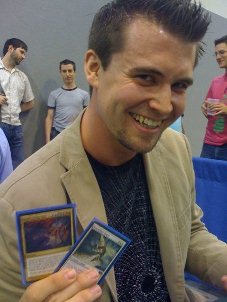
"This is his sad face."
"I really love all of the things I do. I love making games, I love playing games, and I love writing about games. It would be really hard for me to give up any of them. Each of them is incredibly rewarding in its own way, from the warm fuzzy feeling of watching people having fun playing a game I made, to the thrill of victory from winning a tournament, or just the sense of satisfaction when someone tells me how much they enjoy my writing or how much my videos have helped them improve."
As a vocal and public personality who is not afraid of the spotlight, Brian is very aware of his role as an ambassador for the game and for the gaming community in general.
"I try to set a good example where I can in pretty much all aspects of the game, from attitude and sportsmanship to just trying to represent the game well in the public eye. People have terrible misconceptions about what competitive gaming is like, and I want to be a shining example of why they’re wrong."
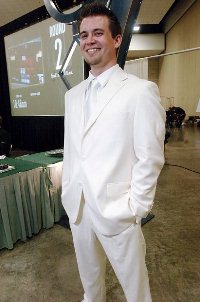
"Literally, shining."
Glorious examples of haberdashery aside, there is no denying that Kibler’s success and consistently optimistic attitude are the result of hard work and a keen sense of what it takes to reach the goals you set for yourself. And acquiring that outlook and achieving the kind of success that Brian has is the result of constantly overcoming obstacles along the way.
There are always roadblocks, and some have rougher edges and more tire-gouging spikes than others. Seeing Kibler’s mega-watt smile and dashing wardrobe now, you would be forgiven for assuming that he entered the world with impeccable taste and the kind of hair that Robert Pattinson dreams of.
He revealed, "I was an awkward, asocial fat kid growing up. I wasn’t athletic, and I had no luck with girls—my first kiss wasn’t until I was 17. The summer between my sophomore and junior years of high school, I was miserable and just decided that I was going to stop being sad and be awesome instead."
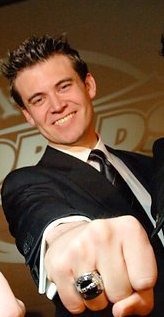
"True story."
"I joined the wrestling team the next year and proceeded to work my ass off to get in shape and excel at the sport. By my senior year, I was in by far the best shape of my life and wrestled on the varsity team, helping my school win our league championship for the first time in nearly [twenty] years. That experience basically shaped my perspective for life, showing me that if I really wanted to do something, even if it was something completely out of my comfort zone, if I worked hard enough I could do it."
That’s not to say everything has to be difficult. Brian did qualify for the very first Pro Tour he ever tried to play in. Of course, as he explains, "I played in the junior division of Pro Tour 1, which was just about who called in and told them they wanted to play."
Then again, if you, like me, were expecting his foray into the heart of the professional Magic scene to be harder when he had to actually qualify, he points out, "My first ‘real’ qualification was also weird, since I won the first Grand Prix I played in, which was GP Toronto in 1997."
Not counting landline phone call PTQs, though, it was still tough to earn that ticket to the gravy train, so Brian’s work ethic is worth emulating. After all, he "beat a ton of players who were big names back then, like Terry Borer and Steve OMS, and a ton more who would become big names in the future, like Worth Wollpert, Mike Turian, Matt Place, and Erik Lauer."
As he suggested, "My Day 2 of that event was like a murderer’s row of pros!"
Ignore the part about some things being easy, unless Wizards starts letting players text for invites. Brian’s journey began in "early 1994" during the earliest days of the game, so he had plenty of experience to draw from and time to learn his craft.
"Back then I played roleplaying games like Dungeons and Dragons and occasionally attended gaming conventions. I was at the Total Confusion convention in Massachusetts when I saw a bunch of people playing this card game all over the halls. It looked cool, so I picked up a few packs while I was there."
His first three rares were "Mox Jet, Bayou, and Kormus Bell, only the latter of which seemed cool to me at the time." While I can’t confirm the story, it would make for a better tale if he traded the other $1200 worth of cards for Shivan Dragons.
It is true, however, that, "I got hooked quickly because of the customizability and strategy of the game—I was always drawn to games that I felt like gave me an edge for my own decisions and ideas. Magic rewards that more than just about any game. In Magic, it’s a good thing to build awesome decks, but people in D&D are a lot less happy when you make a Halfling fighter with strength granting items and specialize in throwing darts because it’s the highest damage possible."
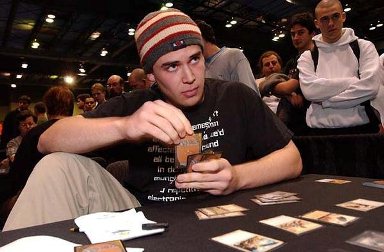
"As with land wars in Asia, you don’t mess with Kibler’s dart-throwing halflings. Or his hats."
If you can’t tell from his rules-lawyering D&D strategies, Brian Kibler enjoys winning. Being self-motivated in the same way he was able to go from rotund to robust, he is able to set the bar high and work hard to accomplish what he wants to.
"I want to be the best at everything I do, which is tough, because I do a lot of things. As for specific things I want to accomplish—well, I’m hoping the secret project we’re working on turns out to be as awesome as I think it has the potential to be."
The project in question refers to a mysterious endeavor stemming from his involvement in game development. When he isn’t dominating Pro Tours and breaking hearts, Brian Kibler is part of the collaborative effort that has produced one of the best non-collectible deckbuilding games of all time.
"I love the team we’ve put together for Ascension. It’s awesome that I get to work every day on stuff I enjoy with like-minded people who happen to be some of my best friends."
He is quick to point out that he been involved in a number of other games as well. "I actually worked on a lot of games before Ascension—I was at Upper Deck for a number of years where I worked on the Vs. System TCG, Quickstrike, and was one of the initial designers and head developer of the World of Warcraft TCG for the first few years of its existence."
In fact, "That’s where most of the Ascension team cut our teeth making games."
Anyone who hasn’t tried Ascension yet is missing out on a fantastic play experience that rivals the number of decisions and strategies inherent in the game we all enjoy. The game is tricky, though, and I asked Brian if he had any strategic advice that he hadn’t necessarily shared elsewhere. If you haven’t picked up the game yet, you owe it to yourself to give it a try, but if you have, Brian’s answer might prove invaluable:
"People don’t pay enough attention to controlling the length of the game. If your opponent buys a turn 1 Arbiter of the Precipice and you try to fight them with a rune strategy, you’re going to lose because their deck is going to get better as the game goes on and they banish starting cards. If you focus on ending the game before their banishing can really accelerate them by getting honor at every opportunity, you can still win quite handily."
As amazing as Ascension is, in the end, "It all really comes back to Magic—[Ascension’s developers] all met each other playing Magic, and got a sense of each other’s strengths through working together for tournaments and the like. We’re actually only just now looking at hiring people through normal channels—everyone else we’ve brought on board in any capacity has ultimately come from knowing them through Magic."
He explains that, "Playing Magic is a great way to get a feeling for how game systems work. Playing competitive Magic is a good indication that someone might have the skills to be a good game developer."
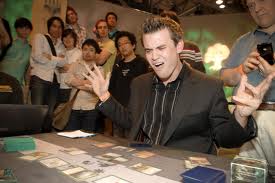
"Also, if you can do this."
For players still grinding away at the PTQ level or spending their weekends chasing an elusive SCG Open Series Top 8 or Invitational spot, Brian’s own experience allows him to pass on invaluable advice.
"When you play games for a living, you’re going to lose a lot, and you have to get good at it."
Like Craig Jones, Brian acknowledges that luck or elements of random chance play a role in pursuing gaming as more than just a hobby. In fact, he points out that it the ability to deal with bad die rolls or the inevitable mana screw can serve a person in every walk of life.
"Being able to handle misfortune is an important life skill," he said. "Being a good sport and having a balanced perspective is incredibly important, not just for your mental health but for your ability to be successful."
He went on, explaining that, "The term gets thrown around a lot because of the popularity of poker, but ’tilt’ is very real and can have enormously detrimental effects in all the aspects of your life."
Going back to the notion of applying yourself in order to improve, Kibler’s point becomes even more relevant. It isn’t enough to just memorize pick orders or watch draft videos and streams. Success in Magic comes from a conscious decision to become better at every aspect of the game.
The notion is not new that it takes several thousand hours of engaged learning, doing, and reviewing to become adept at any given task. Too often players expect to grab the latest decklist from the coverage page to start demolishing their opponents without realizing that the opposition has the same access to the same web sites.
Fortunately, the game is not going anywhere.
Kibler points out that, "I think recently they’ve done a much better job attracting new players with better set design and things like Duels of the Planeswalkers bringing in a younger audience."
He said, "For a long time, Magic was great at retaining players but not great at attracting new ones, so old timers like me come back or stick around but fewer younger players were getting into the game. Sets like Time Spiral are awesome for people who have played as long as I have but don’t make sense to people playing for the first time."
But with the changes in design philosophy and the improvement of the player experience, "We’re just going to see Magic continuing to grow with both young and old demographics if they keep it up."
So don’t despair if you can’t get out of the X-2 bracket or earn your promo foils at FNM. The growth of the gaming industry over the last few years has been incredible to watch. For players, like Brian, who started in the mid-90s, the gulf between gamers and the mainstream has shrunk to the point that it is almost impossible to find someone who doesn’t regularly load up Angry Birds, Words with Friends, or, yes, even Ascension.
"Games are exploding. The connectivity of the mobile internet age means that there’s a huge market of people who are constantly looking for stimulation. Passive media, like TV and movies, aren’t enough to satiate a lot of people who are used to have continuous feedback from the Internet."
The truth is that, "Social gaming is still incredibly young, and Zynga is already a multi-billion dollar company."
We have entered an era where "streaming game tournaments get viewership rivaling professional sports events."
As long as they make the time and put for the effort to improve, more and more players are going to be able to compete and earn a living battling in the trenches or behind office desks all while indulging their favorite pastime.
Brian summed it all up perfectly, "It’s an incredibly exciting time to be a gamer, and I’m thrilled to be a part of it."
Ben’s first three rares were Natural Selection, Deathlace, and Purelace. It’s a wonder he ever bothered to crack packs again. Still, he didn’t give up, and was once rewarded with a box of Italian Legends that contained enough Mana Drains to pay for a semester of college. Of course, he spent the money on more cards. For more of his writing, check out wherethemeatcomesfrom.blogspot.com or follow him on Twitter: @snglmaltproof.
